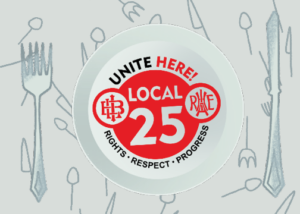Restaurants across the country and in D.C. closed on Monday, Feb. 3 as part of the ‘Day Without Immigrants’ protest. The nationwide protest sprung up from social media campaigns reacting to Trump’s Jan. 23 executive order contesting birthright citizenship, among other anti-immigration policies.
Local D.C. organizers supported the protest, urging immigrants who were able to participate to stay home from work, school, and shopping. The protest aimed to show the importance of immigrants in the day-to-day functioning of communities across the U.S.
The Voice spoke to Chef Paolo Dungca of restaurants Hiraya and Kayu in the H Street Corridor about his choice to close shop for Day Without Immigrants.
“As an immigrant myself, I figured it would be a great thing to stand in solidarity with our team,” Dungca said. “Majority of them were participating, and I just wanted to be a big support for them.”
Chris Svetlik (SFS ’09), the owner of Republic Cantina in NoMa, which closed for the day, said he learned about the protest from workers at the restaurant.
“It sounded like it was going to be fairly widespread, and so we just did an informal vote among staff, and it sounded like the majority of staff were looking to participate and not show up to work,” Svetlik said.
Restaurateurs joined the protest for many reasons, including the logistical concerns of running the restaurant without their workers.
“I think some of it is a practical consideration of just, if you don’t have staff, you can’t really open a restaurant,” Svetlik said. “And then some of it is on principle, on our own. It’s been dismaying to see our colleagues subject to anti-immigrant rhetoric, subject to anti-immigrant policy.”
For Dungca, Day Without Immigrants highlights the importance of immigrants in the U.S.
“This day is very special. I mean, America is built on immigrants,” he said. “I feel like the nation can’t really function without everyone being in it.”
Restaurateurs also discussed how to protect their workers day-to-day during the Trump administration, including in light of increased activity from Immigration and Customs Enforcement (ICE). The protest came just days after ICE announced they arrested 7,400 people between Jan. 23 and Feb. 1.
“Recently, there has been a fair amount of support in the context of providing resources as we can get them—know your rights type information, kind of an action plan for what would happen if ICE did show up,” Svetlik said.
Restaurant owners have been researching and preparing to protect their workers. However, a lot of information about anti-immigration policies remains shrouded in confusion and uncertainty. Dungca said he was uncertain about how he plans to act in response to potential ICE raids.
“I don’t really know how to navigate it yet, but in terms of trying to protect our staff, we did look up some stuff and again, with the help of other chefs and owners, they’ve given us a lot of help on what we can do and how we can all help each other out,” Dungca said.
The chefs acknowledged that participating in Day Without Immigrants could pose potential threats to the restaurants by making them more visible targets, according to Svetlik.
“We’re potentially putting our necks out,” Svetlik said. “But at the end of the day, I think the best we can do is just try to be as prepared as possible for anything that comes,” Svetlik said.
While restaurants in D.C. have received a range of responses from customers about their participation in the protest, the majority expressed solidarity, according to Svetlik.
“Definitely some negative comments here and there, people trolling us, but by and large, seeing D.C. folks come out in support of you know, their fellow community members has been very heartening,” Svetlik said. “That’s just the city we live in. People stand up for one another.”






